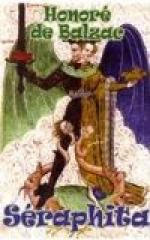From the moment when Wilfrid suspected the ethereal nature of the enchantress who had told him the secrets of his life in melodious utterance, he had longed to try to subject her, to keep her to himself, to tear her from the heaven where, perhaps, she was awaited. Earth and Humanity seized their prey; he would imitate them. His pride, the only sentiment through which man can long be exalted, would make him happy in this triumph for the rest of his life. The idea sent the blood boiling through his veins, and his heart swelled. If he did not succeed, he would destroy her,—it is so natural to destroy that which we cannot possess, to deny what we cannot comprehend, to insult that which we envy.
On the morrow, Wilfrid, laden with ideas which the extraordinary events of the previous night naturally awakened in his mind, resolved to question David, and went to find him on the pretext of asking after Seraphita’s health. Though Monsieur Becker spoke of the old servant as falling into dotage, Wilfrid relied on his own perspicacity to discover scraps of truth in the torrent of the old man’s rambling talk.
David had the immovable, undecided, physiognomy of an octogenarian. Under his white hair lay a forehead lined with wrinkles like the stone courses of a ruined wall; and his face was furrowed like the bed of a dried-up torrent. His life seemed to have retreated wholly to the eyes, where light still shone, though its gleams were obscured by a mistiness which seemed to indicate either an active mental alienation or the stupid stare of drunkenness. His slow and heavy movements betrayed the glacial weight of age, and communicated an icy influence to whoever allowed themselves to look long at him,—for he possessed the magnetic force of torpor. His limited intelligence was only roused by the sight, the hearing, or the recollection of his mistress. She was the soul of this wholly material fragment of an existence. Any one seeing David alone by himself would have thought him a corpse; let Seraphita enter, let her voice be heard, or a mention of her be made, and the dead came forth from his grave and recovered speech and motion. The dry bones were not more truly awakened by the divine breath in the valley of Jehoshaphat, and never was that apocalyptic vision better realized than in this Lazarus issuing from the sepulchre into life at the voice of a young girl. His language, which was always figurative and often incomprehensible, prevented the inhabitants of the village from talking with him; but they respected a mind that deviated so utterly from common ways,—a thing which the masses instinctively admire.
Wilfrid found him in the antechamber, apparently asleep beside the stove. Like a dog who recognizes a friend of the family, the old man raised his eyes, saw the foreigner, and did not stir.
“Where is she?” inquired Wilfrid, sitting down beside him.
David fluttered his fingers in the air as if to express the flight of a bird.




